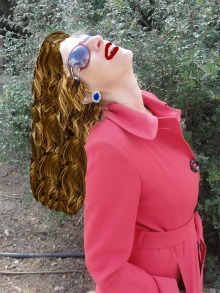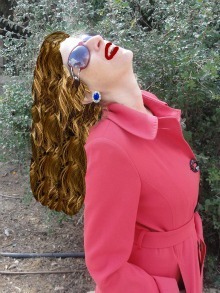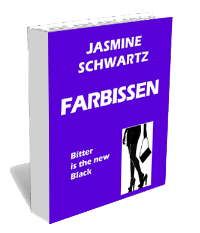Matt Rees's Blog - Posts Tagged "yiddish"
Jasmine Schwartz: Bridget Jones with guns and dead bodies
 I hok you no chainik when I recommend you read "Farbissen" and "Fakakt," the great new crime novels of Jasmine Schwartz. Jasmine is an important and hilarious new voice in crime fiction -- and that's no shmontses! Her first two novels "Farbissen: Melissa Morris and the Meaning of Money" and "Fakakt: Melissa Morris and the Meaning of Sex" use Yiddish words for their titles. When you read the stories of Melissa Morris, a neurotic and fashion-obsessed New Yorker, you'll see why... And we'll be finding out here, too, as Jasmine is going to be doing an interview with us in a couple of days, taking a break from her troubles with a father who's remarrying, the musings of her "future ex-husband," and her ongoing struggle to enter the top 1 percent of US taxpayers, as you'll see from her blog.
I hok you no chainik when I recommend you read "Farbissen" and "Fakakt," the great new crime novels of Jasmine Schwartz. Jasmine is an important and hilarious new voice in crime fiction -- and that's no shmontses! Her first two novels "Farbissen: Melissa Morris and the Meaning of Money" and "Fakakt: Melissa Morris and the Meaning of Sex" use Yiddish words for their titles. When you read the stories of Melissa Morris, a neurotic and fashion-obsessed New Yorker, you'll see why... And we'll be finding out here, too, as Jasmine is going to be doing an interview with us in a couple of days, taking a break from her troubles with a father who's remarrying, the musings of her "future ex-husband," and her ongoing struggle to enter the top 1 percent of US taxpayers, as you'll see from her blog.
Published on May 09, 2012 03:56
•
Tags:
crime-fiction, fakakt, farbissen, jasmine-schwartz, jewish, jews, yiddish
Likeable Schmikeable: Jasmine Schwartz’s Writing Life interview
 The hottest new voice in crime fiction is Jasmine Schwartz. Her great debut “Farbissen” and its follow-up “Fakakt” have earned plaudits for her and for her detective, neurotic New York fashionista Melissa Morris. The books have been called “Bridget Jones with guns and dead bodies.” But Jasmine’s no Renee Zellweger softie, as you’ll see from her hilarious blog. Personally (to misquote a Zellweger line) she had me at the titles. Farbissen means "embittered" in Yiddish, while Fakakt means "screwed." Both her novels are stylish and very funny, but they also tackle important social issues, like race and sex trafficking. Jasmine chats about the way she writes, and why:
The hottest new voice in crime fiction is Jasmine Schwartz. Her great debut “Farbissen” and its follow-up “Fakakt” have earned plaudits for her and for her detective, neurotic New York fashionista Melissa Morris. The books have been called “Bridget Jones with guns and dead bodies.” But Jasmine’s no Renee Zellweger softie, as you’ll see from her hilarious blog. Personally (to misquote a Zellweger line) she had me at the titles. Farbissen means "embittered" in Yiddish, while Fakakt means "screwed." Both her novels are stylish and very funny, but they also tackle important social issues, like race and sex trafficking. Jasmine chats about the way she writes, and why:Plug your latest book. What’s it about? Why’s it so great?
 The book is FARBISSEN: MELISSA MORRIS AND THE MEANING OF MONEY. The novel follows some conventions of a mystery series, while ignoring others completely. It incorporates humor with serious themes, such as depression and racism. As a reader, this is always my favorite kind of writing – when I laugh but also have a deeper, emotional reaction.
The book is FARBISSEN: MELISSA MORRIS AND THE MEANING OF MONEY. The novel follows some conventions of a mystery series, while ignoring others completely. It incorporates humor with serious themes, such as depression and racism. As a reader, this is always my favorite kind of writing – when I laugh but also have a deeper, emotional reaction.How much of what you do is formula dictated by the genre within which you write? Or as close to complete originality as it’s possible to get each time?
Agents and Publishers like to say, about protagonists, "Make them likeable. Every woman should want to be your main character." I always hated that. I love David Sedaris because he can take his deepest flaws, look them in the eye, and make them the centerpiece of his essays. That's who I want to read. Emotional honesty is so much more compelling then a whitewashed character.
What’s your favorite sentence in all literature, and why?
"The story so far: In the beginning the Universe was created. This has made a lot of people very angry and been widely regarded as a bad move." Douglas Adams started The Restaurant at the End of the Universe with that. Why do I love it? Simple. I grew up religious, educated by Rabbis and with an education that begged us not to question the basic concepts of our faith. "In the beginning" is the first sentence of "adult" literature I learned, at age five. But I think Douglas wrote it better.
Who’s the greatest stylist currently writing?
Martin Cruz Smith comes to mind. Larry McMurtry is wonderful. Hilary Mantel's Wolf Hall and A Place of Greater Safety were both phenomenal.
Who’s the greatest plotter currently writing?
Dennis Lehane's Shutter Island was awesome.
Where’d you get the idea for your main character?
I was on the train with my husband. He was considering writing a detective series, and we were brainstorming different sleuths. I said, "How about writing one about a neurotic New Yorker?" Then I realized I should do that one.
Do you have a pain from childhood that compels you to write? If not, what does?
The childhood stuff gets you started writing when you're young, I think. But then, if you continue writing, it's for different reasons. For me, writing brings out my creative energy and taps into my spiritual side. That’s all hard to remember when you confront the commercial aspect of the craft [i.e. selling your work], but it's important to remember this motivation at the core.
What’s the best idea for marketing a book you can do yourself?
My husband is the greatest resource ever for such ideas. I guess that's not doing it myself, but I do feed him.
What’s your weirdest idea for a book you’ll never get to publish?
Aliens on Long Island. Lost tribes and lost souls. Mass face-lifts. It’s sci-fi, baby, sci-fi.
Published on May 23, 2012 09:33
•
Tags:
chick-lit, crime-fiction, how-to-write, women-s-fiction, writers, writing-interviews, writing-life, yiddish
Likeable Schmikeable: Jasmine Schwartz’s Writing Life interview
 The hottest new voice in crime fiction is Jasmine Schwartz. Her great debut “Farbissen” and its follow-up “Fakakt” have earned plaudits for her and for her detective, neurotic New York fashionista Melissa Morris. The books have been called “Bridget Jones with guns and dead bodies.” But Jasmine’s no Renee Zellweger softie, as you’ll see from her hilarious blog. Personally (to misquote a Zellweger line) she had me at the titles. Farbissen means "embittered" in Yiddish, while Fakakt means "screwed." Both her novels are stylish and very funny, but they also tackle important social issues, like race and sex trafficking. Jasmine chats about the way she writes, and why:
The hottest new voice in crime fiction is Jasmine Schwartz. Her great debut “Farbissen” and its follow-up “Fakakt” have earned plaudits for her and for her detective, neurotic New York fashionista Melissa Morris. The books have been called “Bridget Jones with guns and dead bodies.” But Jasmine’s no Renee Zellweger softie, as you’ll see from her hilarious blog. Personally (to misquote a Zellweger line) she had me at the titles. Farbissen means "embittered" in Yiddish, while Fakakt means "screwed." Both her novels are stylish and very funny, but they also tackle important social issues, like race and sex trafficking. Jasmine chats about the way she writes, and why:Plug your latest book. What’s it about? Why’s it so great?
 The book is FARBISSEN: MELISSA MORRIS AND THE MEANING OF MONEY. The novel follows some conventions of a mystery series, while ignoring others completely. It incorporates humor with serious themes, such as depression and racism. As a reader, this is always my favorite kind of writing – when I laugh but also have a deeper, emotional reaction.
The book is FARBISSEN: MELISSA MORRIS AND THE MEANING OF MONEY. The novel follows some conventions of a mystery series, while ignoring others completely. It incorporates humor with serious themes, such as depression and racism. As a reader, this is always my favorite kind of writing – when I laugh but also have a deeper, emotional reaction.How much of what you do is formula dictated by the genre within which you write? Or as close to complete originality as it’s possible to get each time?
Agents and Publishers like to say, about protagonists, "Make them likeable. Every woman should want to be your main character." I always hated that. I love David Sedaris because he can take his deepest flaws, look them in the eye, and make them the centerpiece of his essays. That's who I want to read. Emotional honesty is so much more compelling then a whitewashed character.
What’s your favorite sentence in all literature, and why?
"The story so far: In the beginning the Universe was created. This has made a lot of people very angry and been widely regarded as a bad move." Douglas Adams started The Restaurant at the End of the Universe with that. Why do I love it? Simple. I grew up religious, educated by Rabbis and with an education that begged us not to question the basic concepts of our faith. "In the beginning" is the first sentence of "adult" literature I learned, at age five. But I think Douglas wrote it better.
Who’s the greatest stylist currently writing?
Martin Cruz Smith comes to mind. Larry McMurtry is wonderful. Hilary Mantel's Wolf Hall and A Place of Greater Safety were both phenomenal.
Who’s the greatest plotter currently writing?
Dennis Lehane's Shutter Island was awesome.
Where’d you get the idea for your main character?
I was on the train with my husband. He was considering writing a detective series, and we were brainstorming different sleuths. I said, "How about writing one about a neurotic New Yorker?" Then I realized I should do that one.
Do you have a pain from childhood that compels you to write? If not, what does?
The childhood stuff gets you started writing when you're young, I think. But then, if you continue writing, it's for different reasons. For me, writing brings out my creative energy and taps into my spiritual side. That’s all hard to remember when you confront the commercial aspect of the craft [i.e. selling your work], but it's important to remember this motivation at the core.
What’s the best idea for marketing a book you can do yourself?
My husband is the greatest resource ever for such ideas. I guess that's not doing it myself, but I do feed him.
What’s your weirdest idea for a book you’ll never get to publish?
Aliens on Long Island. Lost tribes and lost souls. Mass face-lifts. It’s sci-fi, baby, sci-fi.
Published on May 23, 2012 09:33
•
Tags:
chick-lit, crime-fiction, how-to-write, women-s-fiction, writers, writing-interviews, writing-life, yiddish



